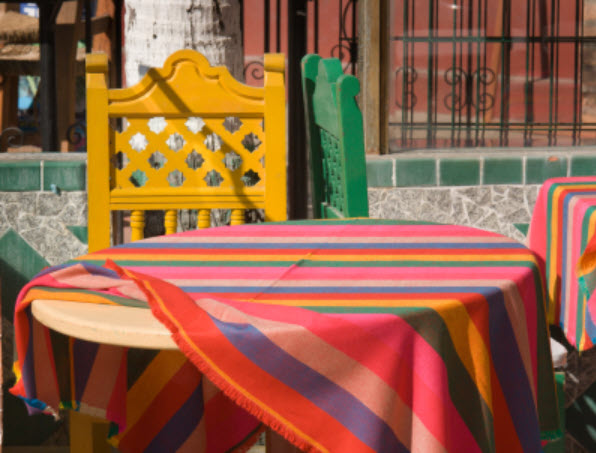Development of Mexico’s Furniture Styles

I love the variety of styles, color, design and materials available in Mexican furniture. When you combine this with the artistry of Mexican artisans, the influence of Moorish and Spanish colonial furniture, and the beautiful woods available in Mexico, the resulting feast of furniture, folklore and art is hard to resist. How did Mexico develop such a flair for beautiful furniture and interior design? That’s a fascinating story.
Pre-Hispanic Mexican furniture
Before the Spanish arrived in Mexico, one of the centerpieces of Mexican furniture was the petate or grass-woven mat. Not dissimilar to the concept of tatami in Japan, the petate consisted of woven natural leaves, grasses, fibers which were then made into chair seats, beds, tables, even doors. Nowadays, we still see this influence in Mexico rustic furniture – for the most part it is called tule and it is charming and beautiful, adding the beauty of the outdoors and a sweet scent (think sweetgrass) to Mexico home environments. Another pre-Hispanic mainstay in Mexico was the hammock. Cool, versatile and comfortable, hammocks had a very practical application: they provided additional beds, didn’t take up much room, and made for a great sleeping option in hot balmy Mexico nights. Mexican hammocks are still used widely not just for decorative but for very practical reasons in Mexico.

Moctezuma plays a part
When Cortes met Aztec emperor Moctezuma in 1519, he gifted the emperor with the very first piece of Spanish furniture to arrive in Mexico. It was a folding chair with painted joints. In the decades that followed, the Spanish Conquest of Mexico brought in European woods such as cypress, pine, cedar and oak. The first carpenters and wood furniture artisans in Mexico were Spanish – they were the only ones permitted (ordained, actually) to make chairs, tables and benches. However, the future indigenous Mexican artisans would look, observe and learn as these furniture pieces were made by the Spanish. When the natives were freed, they combined what they had learned with their own beautiful sensibility, Mexican folklore and colors … and the rest is history.
Furniture styles
In the beginning, the most popular furniture style in Mexico was Spanish Renaissance. This included Moorish bureaus, chairs with turned legs and flat wooden backs, benches that were used for convents and churches. The 18th century saw an emphasis in French and English styles in Mexican furniture, including chairs, desks and bureaus. These were masterfully copied by Mexican furniture makers. Interestingly, during Mexico’s war of independence, pine furniture in bright colors began to be made … perhaps a way to counteract the horrors of war and remind Mexicans of a brighter future ahead.
The future is now
Mexico’s furniture scene is alive and thriving today. Our Mexican artisans constantly surprise us by their ability to produce contemporary, colonial, traditional, mission-style and rustic furniture in many materials and woods: wicker, mesquite, pine, parota, tule, leather. All of it carries the lessons of those many centuries ago, the story of a resilient, gifted and imaginative people; and the love of beautiful, artistic work. Whether they’re building bedrooms for a Mexican beach condo, rustic trunks for a casona or hacienda in San Miguel de Allende, or loft-style modern sofas for a home in Puerto Vallarta … the sky is the limit when it comes to the skill and resourcefulness of our Mexican artisans. Working with them to help you furnish your Mexican dream homes is always a pleasure.
-
Posted in
Announcements, Mexico Living, Products





